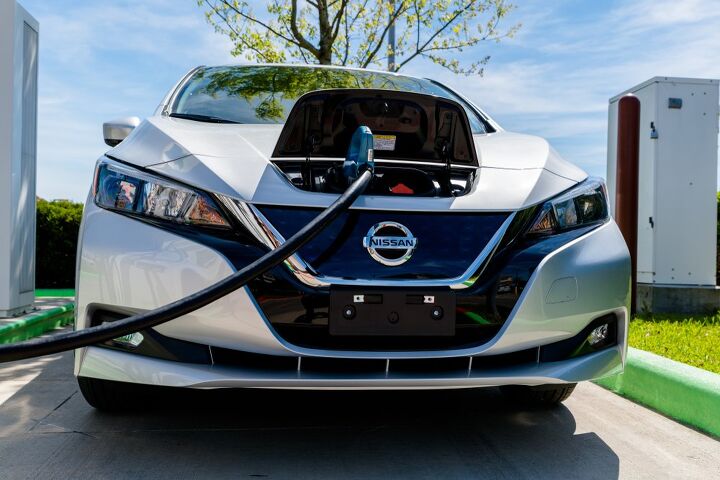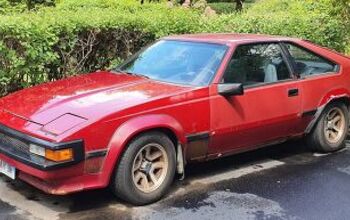Report: Nissan Says Solid State Batteries Coming By 2028

Nissan is reportedly on track to have its very first solid-state battery production plant up and running by 2025, with vehicles leveraging the technology by 2028. While these units are supposed to offer increased range and decreased charging times, improving EV ownership, they also have some shortcomings engineering teams have yet to address. However, this hasn’t stopped a majority of manufacturers from pursuing the technology in the hopes of gaining an advantage over the competition as everyone attempts to transition toward all-electric lineups.
According to a report from Autocar, Nissan plans on sharing more data about its development status later this month at an exhibit to be held in Yokohama, Japan, called “Nissan Futures.” Though executives already believe the company is in a “class-leading position” where solid-state batteries are concerned.
From Autocar:
David Moss, Nissan’s senior vice-president for research and development in Europe, said: “We think we have something quite special and are in a group leading the technology. We want to get the cost down [compared with lithium ion batteries] by 50 [percent], to double the energy density and to offer three times the charging speed.”
Moss said that Nissan had gone from small button cells to larger (10cm) square cells at the current stage of development in Japan. Final cells end up the size of a laptop.
He added that Nissan was working with leading scientists at the University of Oxford on developing the technology, and that Nissan’s solid-state tech was “all solid-state”, in that it removes all liquid elements from the battery.
“Can you delete the liquid electrolyte out of the battery? This is where we think we’re leading,” stated Moss. “Some solid-state batteries still have the liquid electrolytes, and this is an issue, as that liquid boils. The efficiency of that energy in storage and transfer and the power you put into it will be impacted.”
By offering superior energy density than what’s on the market today, solid-state batteries have the potential to make electric vehicles significantly lighter while also improving range. Solid-state vehicles should weigh less, charge faster, and be less fire-prone than their liquid contemporaries. This all makes the concept of all-electric semi trucks more plausible. Though Nissan will undoubtedly be leading with passenger vehicles for its first foray into the space.
The Japanese will undoubtedly have to develop an entirely new platform to facilitate this and may not be the first automaker to put such a vehicle on the market. BMW and Toyota (in addition to a handful of other brands) are likewise working on solid-state technology and they’re targeting launch dates closer to 2025. At the same time, Nissan and just about every other automaker under the sun have plans to continue developing next-gen versions of lithium-ion batteries using reduced quantities of cobalt that are alleged to be cheaper and less ethically troublesome to build. However, it’s incredibly difficult to know what’s real and what’s just marketing hype anymore.
For the last 15 years, we’ve heard constant promises about how self-driving vehicles and solid-state batteries were right around the corner. But the industry appears to be getting no nearer to any kind of commercially available application. I’m not sure Nissan having a later start date than other manufacturers even matters because every company working on electric vehicles just seems to come up with a new timeline for next-generation batteries once they’re closing in on the previous target.
Meanwhile, we’ve seen the range of modern EVs artificially restricted by manufacturers to create additional trims. Remember when Tesla extended the range on certain Florida vehicles in order to help people escape Hurricane Irma in 2017? While initially viewed as a publicity win for the company, it didn’t take long for people to realize that this meant base-model cars came with software that limited the maximum potential of their battery packs. Almost every new technology is starting to feel like vaporware, with the only exception being software that helps manufacturers retain the maximum amount of control of a physical product you spent tens of thousands of dollars buying.
Though there are a few valid reasons that solid-state batteries have been delayed, starting with cost. Electric cars are already significantly more expensive than their combustion-reliant counterparts and swapping to solid-state tech will undoubtedly exacerbate this. But there’s also a question of durability. Despite offering benefits in terms of energy capacity and charging speed, most engineers remain worried that solid-state batteries won’t have the same lifespan as what’s on the market today. It’s an issue everyone is working on and one nobody has been able to solve thus far. Then again, battery-powered cars have technically been around since 1881 and have seen their popularity wax and wane throughout the twentieth century. Sometimes the technology just doesn’t advance enough or the industry decides it isn’t profitable. However, there’s an obviously coordinated push between numerous governments and the automotive industry this time.
We’ll see what happens. Nissan is one of those companies that everyone likes to discount due to its troubled history and general focus on mass-market automobiles. But let’s not forget that it managed to stay ahead of the curve with the Leaf, effectively becoming the first mainstream automaker to offer an EV in the modern era. It also has development support from Renault, which appears extremely interested in building all-electric cars right now.
[Image: michelmond/Shutterstock]
Become a TTAC insider. Get the latest news, features, TTAC takes, and everything else that gets to the truth about cars first by subscribing to our newsletter.

A staunch consumer advocate tracking industry trends and regulation. Before joining TTAC, Matt spent a decade working for marketing and research firms based in NYC. Clients included several of the world’s largest automakers, global tire brands, and aftermarket part suppliers. Dissatisfied with the corporate world and resentful of having to wear suits everyday, he pivoted to writing about cars. Since then, that man has become an ardent supporter of the right-to-repair movement, been interviewed on the auto industry by national radio broadcasts, driven more rental cars than anyone ever should, participated in amateur rallying events, and received the requisite minimum training as sanctioned by the SCCA. Handy with a wrench, Matt grew up surrounded by Detroit auto workers and managed to get a pizza delivery job before he was legally eligible. He later found himself driving box trucks through Manhattan, guaranteeing future sympathy for actual truckers. He continues to conduct research pertaining to the automotive sector as an independent contractor and has since moved back to his native Michigan, closer to where the cars are born. A contrarian, Matt claims to prefer understeer — stating that front and all-wheel drive vehicles cater best to his driving style.
More by Matt Posky
Latest Car Reviews
Read moreLatest Product Reviews
Read moreRecent Comments
- SPPPP I am actually a pretty big Alfa fan ... and that is why I hate this car.
- SCE to AUX They're spending billions on this venture, so I hope so.Investing during a lull in the EV market seems like a smart move - "buy low, sell high" and all that.Key for Honda will be achieving high efficiency in its EVs, something not everybody can do.
- ChristianWimmer It might be overpriced for most, but probably not for the affluent city-dwellers who these are targeted at - we have tons of them in Munich where I live so I “get it”. I just think these look so terribly cheap and weird from a design POV.
- NotMyCircusNotMyMonkeys so many people here fellating musks fat sack, or hodling the baggies for TSLA. which are you?
- Kwik_Shift_Pro4X Canadians are able to win?


































Comments
Join the conversation
"You can buy them now for drone applications."
Link?
Nissan would not make this announcement if it were not based on the results of their research and development. I would be very surprised if SS batteries don't make it to mass production earlier than they are predicting, since so many companies are working on them.
If it were VinFast or Tesla making this promise, then yeah, lots of grains of salt would be in order. Japanese car companies, especially large ones, are conservative in what they promise, and would not want to suffer the colossal embarrassment of making significant promises without being able to follow through on them.